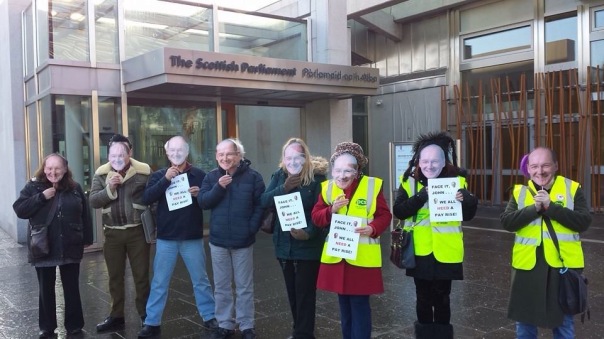In the last week, thousands of PCS members across Scottish Government, Scottish Parliament, Culture and Justice bodies completed a two month rolling programme of strike action on the case for a fair pay Scotland.
As ever, we can be proud at the vast numbers of PCS members willingly sacrificing a day’s salary by taking the difficult decision to withdraw their labour. Pre-dawn PCS pickets braved icy temperatures to stand outside their workplaces to seek support from non-members, visitors, the public and others.
Some official and social media commentators perhaps too young or inexperienced in industrial relations judge success on the number of pickets or duration of the picketline. PCS picket activity generally involve a small number of local reps outside their own workplaces from 7 to 10am, when most office flexi shifts clock on. We speak to those going in about our cause – contractors and other staff not covered by the union ballot. We often recruit new members as workers turn away not wishing to cross a picketline. On the rare occasion when a PCS member seeks to cross the picket-line we seek to convince them not to scab in their co-workers and to join the solidarity union action.
Thatcher’s anti-union laws were designed to make it difficult for class solidarity, outlawing secondary action and restricting the number of pickets. Yet still PCS support last week came from not only our own striking members staying home, but from other union members refusing to cross a picketline, bringing us hot drinks and breakfast and extending practical solidarity by refusing to cover duties of a striking worker. CWU members delivering mail to many government office regularly turn back when they see a PCS picketline. Other trade unionists cancel meetings with officials in Government and Parliament buildings on PCS strike days rather than cross our picket lines. Drivers toot their horns and passers by wave and display thumbs up. All of these acts of class solidarity give our members a boost, and affirm that right is on their side.
It is sad then, that our political class has become hardened to the industrial plight of the public servants that look after them in Holyrood. Last Thursday, with the exception of 10 principled MSPs (5 Labour and the 5 Green and Independent members), SNP and Labour politicians alike saw fit to cross our picket lines en masse. That the Parliament functioned that day can only be down to management pressure on non-PCS staff to cover the duties of striking workers. To use industrial language, this is scabbing.
Therefore any progressive politician crossing our lines and participating in Parliament business on a strike day should consider their own conscience. We expect as much from the Tories and Liberals, but many MSPs that otherwise style themselves as champions of the underdog appear oblivious to long held labour and trade union movement principles when it comes to the unionised Scottish Parliament workers that deliver Parliamentary services to them at Holyrood day in day out. Surely these hard working and loyal public servants withdrawing their labour, sacrificing a days salary in protest against austerity pay are as worthy of support and solidarity as any other Scottish worker in dispute.

